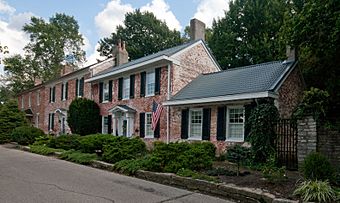Water Street Historic District (Augusta, Kentucky) facts for kids
Quick facts for kids |
|
|
Water Street Historic District (Augusta, Kentucky)
|
|
 |
|
| Lua error in Module:Location_map at line 420: attempt to index field 'wikibase' (a nil value). | |
| Location | Augusta, Kentucky |
|---|---|
| Architect | Multiple |
| Architectural style | Second Empire, Italianate |
| NRHP reference No. | 75000737 |
| Added to NRHP | September 24, 1975 |
The Water Street Historic District is a special area in Augusta, Kentucky. It's a place where many old and beautiful buildings have been kept safe. This district is so important that it's listed on the National Register of Historic Places. It sits right next to the Ohio River, making it a very scenic spot.
Contents
Exploring the Water Street Historic District
What Makes a Place "Historic"?
A historic district is like an outdoor museum. It's a part of a town or city where buildings, streets, and even parks have special historical value. These areas are protected to keep their unique look and feel. The Water Street Historic District is recognized for its old homes and their interesting designs.
Where is Water Street?
This district is in Augusta, Kentucky. It stretches along the Ohio River. You can find it from River Side Drive east to Frankfort Street. It also goes west to Ferry Street. This location gives many homes great views of the river.
Homes and Architecture
The homes in the Water Street Historic District show many different styles. They were built in the late 1700s and early 1800s. These older houses often have a balanced, even look.
Victorian Era Homes
Later, during the Victorian era, some new houses were built. These homes look different from the older ones. They often have unique shapes and designs. You might see porches that are set back into the house. Some have parts that stick out with pointed roofs. Many also have bay windows, which are windows that project outwards.
Special Details
The windows and doors on these homes are often taller than usual. They also have fancy decorations. Look for "hoodmolds" above the windows. These are decorative frames that look like little hoods. Other special trims add to the beauty of these historic buildings.

